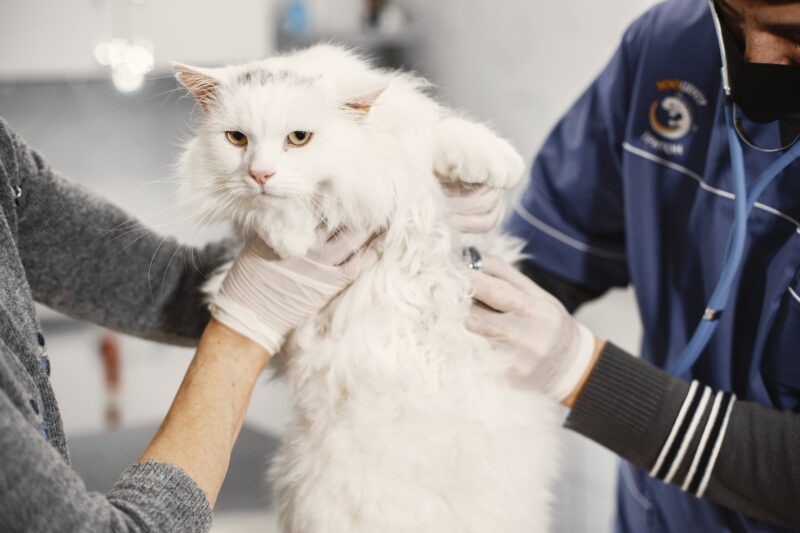Roundworms are parasites that live in your feline friend’s intestines. They are also known as ascarids. Roundworms are the most common intestinal parasite in cats. They can affect cats of all ages, but they are more common in kittens. Unfortunately, roundworms are a common cause of illness and even death in kittens.
According to VCA Animal Hospitals, almost all cats will become infected with roundworms at some point in their life. These worms are typically white or light brown in color and can grow quite long, averaging three to six inches (8-15 cm) in length.
What are the Signs and Symptoms of Roundworm Infection in Your Feline Friends
Signs and symptoms of roundworm infection in your feline friend may include:
Vomiting: Tabbies with roundworm infections may vomit, and sometimes, adult worms may be visible in the vomit.
Diarrhea: Infected cats may experience diarrhea, which can sometimes contain visible roundworms or segments of the worms.
Swollen Abdomen: Severe infestations can lead to a distended or swollen abdomen in kittens. This is sometimes referred to as a “potbelly” appearance.
Lethargy: Infected tabbies may appear lethargic or have a decrease in overall activity.
Weight Loss: Despite a good appetite, some tabbies may experience weight loss due to the worms absorbing nutrients from the cat’s digestive system.
Dull Coat: A feline with roundworms may exhibit a dull or unhealthy-looking coat.
Visible Worms in Stool: Adult roundworms or worm segments may be visible in the cat’s feces.
Coughing: In some cases, if the roundworm larvae migrate to the respiratory system, coughing may occur.
It’s important to note that not all infected felines will display obvious symptoms, especially in the mild or early stage of infection. Additionally, roundworms can be transmitted from mother to kittens during nursing, so even young kittens may be affected. If you suspect that your fuzzy friend may have roundworms or if you observe any of the mentioned signs, it’s crucial to consult with a veterinarian for proper diagnosis and treatment. Veterinarians typically perform fecal examinations to detect the presence of roundworm eggs, and treatment often involves deworming medications. Regular veterinary check-ups and preventive deworming measures are essential to maintain your cat’s health and prevent parasite infestations.

How to Diagnosis Roundworm Infection
The diagnosis of roundworm infection in cats is typically made through a combination of clinical signs, fecal examinations, and, in some cases, additional diagnostic tests. Here’s how veterinarians diagnose roundworm infections in cats:
History Taking: Your veterinarian will begin by gathering information about your purr baby’s medical history and observe any clinical signs that may indicate a parasitic infection, such as vomiting, diarrhea, lethargy, weight loss, or a potbelly appearance.
Fecal Examination: The most common method for diagnosing roundworm infections is through a fecal examination or a fecal float test. A small sample of the tabby’s feces is examined under a microscope to detect the presence of roundworm eggs. However, it’s important to note that not all infected cats will shed eggs consistently, so multiple fecal samples may be necessary.
Physical Examination: During a physical examination, the veterinarian may palpate your tabby’s abdomen to check for a distended or swollen appearance, which can be indicative of a severe roundworm infestation.
Observation of Worms: In some cases, adult roundworms or segments of worms may be visible in your tabby’s vomit or feces. This observation can provide additional evidence of roundworm infection.
How to Prevent Roundworm Infection
Preventing roundworm infections in cats involves a combination of good hygiene practices, regular veterinary care, and preventive measures. Here are some tips to help reduce the risk of your cat getting infected with roundworms:
Regular Veterinary Check-ups: Schedule regular veterinary examinations for your cat, and follow your veterinarian’s recommendations for routine vaccinations and parasite prevention.
Fecal Examinations: Have your veterinarian perform routine fecal examinations to check for the presence of intestinal parasites, including roundworms. Early detection allows for prompt treatment.
Deworming: Administer deworming medications as recommended by your veterinarian. Deworming is an essential part of preventive care, especially for kittens and outdoor cats. Consult with your veterinarian to determine the appropriate deworming schedule for your cat’s age and lifestyle.
Hygiene Practices: Practice good hygiene to reduce the risk of contamination. Clean your cat’s litter box regularly, and promptly dispose of feces. Wash your hands thoroughly after handling your cat, especially before eating.
Keep Indoor Cats Indoors: If possible, keep your cat indoors to minimize exposure to contaminated soil and feces from other animals. Outdoor cats are at a higher risk of contracting roundworms.
Control Fleas: Fleas can transmit certain types of roundworms. Use veterinarian-recommended flea control products to prevent flea infestations in your cat and home.
Prevent Hunting: If your cat is allowed outdoors, discourage hunting. Rodents and birds can be carriers of roundworms, and hunting increases the risk of ingestion of infected prey.
Provide a Balanced Diet: Feed your cat a well-balanced and nutritious diet. A healthy immune system can better defend against parasite infections.
Avoid Raw Meat: Avoid feeding your cat raw or undercooked meat, as it may be a source of roundworm infection.
Clean Living Spaces: Keep your home environment clean and sanitary. Regularly clean and disinfect areas where your cat spends time, including bedding and toys.
Remember that even with preventive measures, it’s crucial to monitor your purr baby’s health and seek veterinary advice if you notice any signs of illness. Regular veterinary care and preventive measures contribute to the overall well-being of your cat and help minimize the risk of parasite infections.


